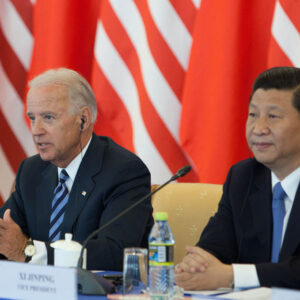President Joe Biden faces his greatest challenge in heading off armed conflict with China while trying to appease the Chinese into relaxing their aggressive tendencies all around Asia. Nowhere is the conflict in Biden’s China policy more acute than in his carefully stated, ambivalent pronouncements on Taiwan, the Republic of China, the off-shore Chinese province that remains staunchly independent from mainland China, the People’s Republic of China.
It was to be expected when Biden and China’s President Xi Jinping staged their “virtual summit” from their respective capitals that Biden would support “one China.” That’s by way of recognizing that Beijing in theory may include Taiwan as legitimately a part of its territory.
Biden’s affirmation of “one China,” however, does not mean the U.S. is betraying Taiwan. Under the Taiwan Relations Act, enacted more than 40 years ago, the U.S. “opposes unilateral efforts to change the status quo or undermine peace and stability across the Taiwan strait.” That dire warning remains in effect. Superficially, nothing would appear to have changed since Chiang Kai-shek led his defeated forces across the 110-mile-wide Taiwan Strait as Mao Zedong’s Red Army was completing its victory on the Chinese mainland on October 1, 1949.
On yet another level, though, Biden remains his usual unconvincing self. One would not have expected him, in that much-anticipated meeting with Xi, to go out of his way to anger the Chinese leader, but he hardly appeared like a stalwart figure in the face of a potential threat not only to Taiwan but to the American position in Asia
In the final analysis, no one can tell just how the U.S. will react if China at long last launches an attack on Taiwan. More than seven decades since the rise of Communist China, we’ve heard so many Chinese claims to the island province that it’s easy to dismiss their latest as familiar propaganda.
Yet there are increasing signs that China may soon do more than pose an abstract threat. Most recently, Chinese fighter planes have intruded into the air defense zones of Taiwan as well as South Korea. The U.S. has sold billions of dollars of armaments, ranging from planes to tanks, to Taiwan and has sent a few Marines and special operations troops as advisers to small units on the island, but there’s no sign the Americans would marshal a force needed to forestall Chinese attack.
Taiwan’s military, nearly 300,000 in all services, would desperately need the Americans to rush to the defense against the People’s Liberation Army, 2,185,000 on active duty backed by an increasingly modern air force and navy.
That’s where Biden would face his most severe test.
After the U.S. withdrawal from Afghanistan, it’s reasonable to question Biden’s willingness to wage war against any foreign force. The upcoming Winter Olympics in Beijing may at least test his will to stand up against Chinese rhetoric. Biden may order a “diplomatic boycott” of the games, meaning U.S. officials at all levels would stay away. That gesture, however, would be of no concern to millions focusing on the games, not on the people in the stands. As long as the U.S. sends its best cold-sport athletes, the world will not really care.
But if the U.S. orders a total boycott of the Games, including athletes and officials, many around the world will criticize the Americans as poor sports for politicizing what should be a great chance to show off the skills of U.S. performers on the ice and snow. Just think of the criticism, that overwhelmed Jimmy Carter when he pulled the U.S. from the 1980 Summer Olympics in Moscow as punishment for the Soviet Union’s refusal to get out of Afghanistan. Several months later, Carter lost to Ronald Reagan in his bid for a second term in the White House.
Nor would a boycott of the Olympics, whether diplomatic or total, really prove Biden’s dedication to Taiwan or South Korea or any other country feeling Chinese pressure. A boycott might grab a few headlines but would not tell us what Biden would do militarily if the Chinese were to attack Taiwan.
Biden and Xi in their virtual summit reaffirmed their desire for peace, relieving growing tension, but only postponed the showdown that will test the depth of Biden’s will to defend America’s friends.

